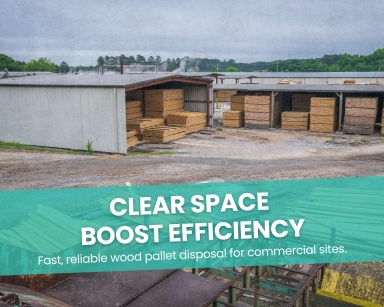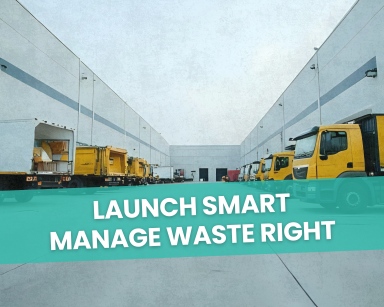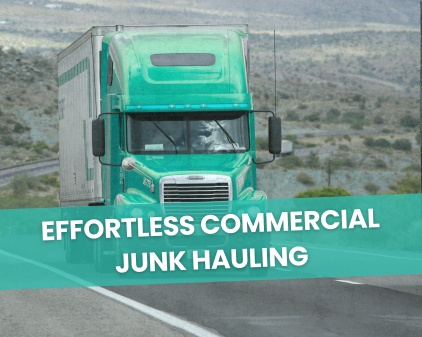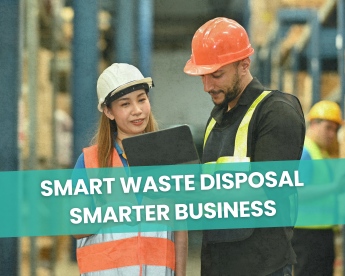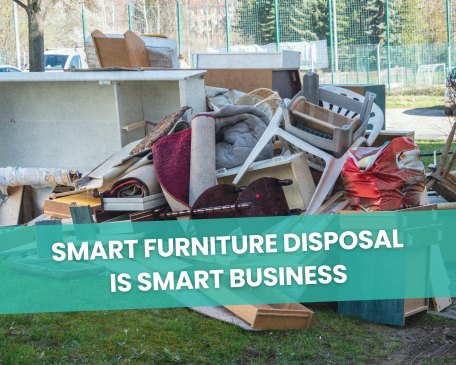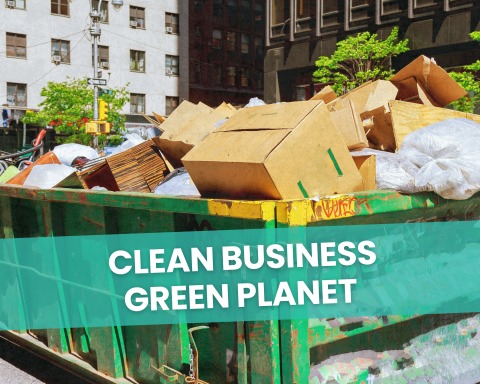The Comprehensive Guide to Proper Disposal of Expired PPE
Table of Contents
The Importance of Proper PPE Disposal
By the end of 2020, an estimated 194 billion disposable masks and gloves were being used worldwide every month. With the pandemic having amplified the use of such equipment, the environmental and business implications of its disposal have never been more pressing. In the midst of global crises, many institutions amplified their use of PPE, inadvertently contributing to another looming crisis: waste management. As global citizens, while we understand the immediate implications of not using PPE, it’s crucial to understand the long-term effects of not disposing of them correctly. Research indicates that an astounding percentage of used PPE finds its way to the natural environment, posing a dual challenge: protection against the pandemic and prevention of an ecological disaster. The cost isn’t just environmental, improper PPE disposal can tarnish a company’s reputation. This article will explore why expired PPE needs a better disposal solution, and how businesses can act responsibly.
The Lifespan of PPE: When is Disposal Needed?
Studies show that over 75% of the pandemic-related masks, as well as other PPE waste, ended up in landfills and the oceans.
The world of safety gear, especially post the COVID-19 pandemic, has seen a significant increase in PPE usage. This includes face masks, gloves, and other personal protective equipment. But like every product has its life cycle, PPE is no different.
Businesses have felt the financial and environmental strain of having to frequently replace and dispose of expired PPE. To understand the correct PPE disposal methods, it is essential to be aware of the life of these products.
Generally, most masks, respirators, and other personal protective equipment have a shelf-life of anywhere between 1 month to 3 years depending on the product type and usage conditions.
Therefore, it is essential for businesses to have a disposal plan in place that ensures their products are always up-to-date and disposed of responsibly.
Identifying the End-of-Life of PPE:
PPE, like masks and gloves, eventually wears out. Whether through visible damage or material degradation, recognizing when your PPE needs disposal can ensure both safety and environmental responsibility. There are clear markers to identify the end-of-life for PPE:
- Color Fade: Especially relevant for masks and nitrile gloves. A faded color often indicates material degradation.
- Elasticity Loss: A stretched-out ear loop or a glove that doesn’t snugly fit is a clear sign that it’s time to replace and responsibly dispose of the PPE.
- Physical Damage: Any visible tears, holes, or compromises in the PPE’s structure render it unsafe and ready for disposal.
Risks of Utilizing Expired PPE:
Using expired PPE isn’t just ineffective, it’s dangerous. Beyond personal safety risks, using expired PPE has wider implications. For instance, an expired mask might not provide adequate filtration, leading to a false sense of security while endangering public health.
There’s also the potential environmental hazard as damaged PPE can release pollutants.Similarly, degraded gloves might result in skin irritations or fail to prevent cross-contamination in critical environments.
Factors Affecting PPE’s Lifespan:
Following are some of the factors that affect PPE’s lifespan,
- Physical Wear and Tear: Regular use can lead to minute tears, especially in gloves and masks.
- Environmental Factors: Humidity, temperature, and exposure to chemicals can degrade PPE materials faster.
- Storage Conditions: PPE stored inappropriately might expire before its due date.
- Exposure to Pathogens: In healthcare, continuous exposure to pathogens can compromise PPE integrity faster.
Proper PPE Disposal Techniques
Recent surveys indicate that over 60% of companies have no proper PPE disposal strategy, despite the environmental risks involved. Sustainability is the watchword, especially when it comes to PPE disposal.
Many companies, in a bid to promote safety during the COVID-19 pandemic, have stockpiled PPE. However, without proper disposal techniques, they might inadvertently contribute to environmental degradation.
The Downfall of Landfills:
Landfills might seem like the easy way out, but they’re far from sustainable. Each PPE item dumped there takes years, sometimes decades, to break down.With pollutants leaching into soil and water systems, it’s clear that our usual methods of PPE disposal need a rethink.
Landfills, once considered the solution to waste problems, are now recognized as environmental hazards. Key challenges associated with landfills include:
- Methane Emissions: Decomposing organic matter in landfills releases methane, a potent greenhouse gas.
- Groundwater Contamination: Harmful chemicals can leach into the ground, contaminating water sources.
- Land Consumption: Landfills consume valuable land resources, often leading to deforestation and habitat loss.
The Advent of Beneficial Reuse:
By repurposing PPE waste, this method not only mitigates environmental harm but also turns waste into something of value. Happen Ventures, among others, utilizes beneficial reuse to transform PPE waste into new materials, reducing the need for raw resources.
Their approach not only lessens environmental strain but also offers a blueprint for other businesses aiming to tackle the PPE disposal challenge head-on. By adopting the beneficial reuse model, businesses can,
- Reduced Waste Costs: Companies can save up to 50% on waste disposal by repurposing surplus PPE.
- Environmental Protection: This approach prevents soil and water contamination, playing a pivotal role in preserving our planet.
Innovative Nitrile Glove Recycling
The ubiquitous blue glove has become a symbol of safety in these times, but also a challenge in terms of disposal. While nitrile gloves have played a crucial role in health safety, their disposal has led to severe environmental repercussions.
With the hikes in the pricing of raw materials, there’s an urgent need to develop a cost-effective and sustainable recycling process for nitrile gloves disposal.
The Environmental Cost of Discarded Nitrile Gloves:
Tons of nitrile gloves find their way into landfills every year, taking decades to decompose. Their disposal is a looming environmental crisis. It’s alarming to consider that every piece of nitrile glove discarded is destined to persist in our environment for decades, if not centuries.
Beyond landfill accumulation, discarded gloves often find their way to oceans, causing harm to marine life and entering the human food chain.
Transforming Waste to Worth:
Companies are now turning to advanced recycling techniques, converting discarded gloves into usable plastic products, from bins to playground equipment.
Nitrile gloves recycling, especially through the lens of beneficial reuse, offers a glimpse into a more sustainable future where waste is minimized.This shift not only reduces waste but also reduces the need to produce new plastic, creating a circular economy.
Safe Unused Mask Disposal Methods
While masks have become the emblem of the pandemic, their disposal has been a conundrum. Discarded irresponsibly, these masks can wreak havoc on our environment.
Traditional Mask Disposal Method:
Traditionally, disposable masks have been treated like regular trash. This means that after their use, they are often thrown into general waste bins, which eventually make their way to landfills.
This straightforward disposal method might seem harmless, but it comes with several drawbacks:
- Volume: Given the sheer number of masks being used and discarded, the volume of waste has skyrocketed. This puts added pressure on waste management systems and landfills.
- Degradation Time: Most disposable masks, especially the surgical kind, are made from a type of plastic called polypropylene. These can take hundreds of years to degrade.
- Hazards to Wildlife: Improperly discarded masks can end up in natural environments where animals can mistake them for food or get entangled in them.
- Public Health Risk: Masks thrown carelessly in public places can become a potential source of contamination.
While the traditional method is straightforward, its environmental and health implications make it unsustainable in the long run, especially with the increase in mask usage during the pandemic.
The Problem with Improper Face Mask Disposal:
From clogging waterways to endangering marine life, the improper face mask disposal is an environmental catastrophe waiting to happen.
- Waterway Blockages: Masks discarded improperly often end up clogging our drainage systems.
- Marine Life Threat: These masks also pose a severe threat to marine life when they find their way into oceans.
- Health Compromises: When these discarded masks end up in waterways, they break down into microplastics.When these microplastics are ingested by marine animals they make their way up the food chain, eventually impacting human health.
Implementing Sustainable Mask Disposal:
Again, beneficial reuse offers a solution. Through specialized processing, companies like Happen Ventures have shown that masks can be repurposed, reducing their environmental footprint.
Beneficial reuse doesn’t just apply to physical repurposing. Chemical recycling processes, for instance, can break down mask components, separating and reusing individual materials in new products, from textile fibers to packaging.
Unused PPE Removal Procedures
Stockpiles of unused PPE might seem harmless, but their disposal presents a significant challenge.
The Burden of Stockpiled Unused PPE:
- Occupied Space: Warehouses full of unused PPE not only occupy space but also represent an ecological liability if not disposed of properly.
- Environmental Concerns: Beyond storage costs, stockpiled PPE is a ticking environmental time bomb. If not disposed of responsibly, this unused PPE might end up causing the same environmental problems as used PPE.
Eco-Friendly Solutions to Unused PPE:
Beneficial reuse comes to the rescue again. By transforming unused PPE into valuable resources, we can address both the ecological and economic challenges they present.
Solutions include donation drives for unopened PPE to countries or institutions in need, and recycling programs where unused PPE is broken down and its materials are repurposed.
Environmental Impact of Incorrect PPE Disposal
The cascade effect of improper PPE disposal isn’t just limited to our planet, it affects businesses too.
Beyond the Trash Bin:
The impact of discarded PPE on our ecosystems is profound, affecting everything from soil health to aquatic life.
Our waterways, green spaces, and urban areas have all borne witness to the ill effects of PPE littering. This not only mars the beauty of our landscapes but also presents direct threats to wildlife, especially aquatic creatures.
The Business Repercussions:
Reputational damage, fines, and loss of trust, businesses face all these and more if they don’t address PPE disposal responsibly. Beyond the immediate financial penalties for improper disposal, businesses also face long-term reputational risks.
Modern consumers value eco-responsibility, and businesses failing in this aspect might find themselves losing customer trust and loyalty. Following are some risks,
- Reputational Risk: Businesses that don’t prioritize responsible PPE disposal can face public backlash.
- Financial Penalties: Non-compliance with disposal regulations can lead to heavy fines.
Reducing Mask Waste and Improving Sustainability
Masks are everywhere, and so is the challenge of their waste.
The Economic and Ecological Cost of Wasted Masks:
It’s estimated that billions of dollars are spent annually on masks. Billions spent on masks equate to a potential waste crisis if not addressed promptly. Without proper disposal systems in place, this translates to environmental costs that far exceed the financial ones.
- Financial Implications: With billions spent on masks, their wastage means significant financial losses.
- Environmental Threat: Discarded masks can contribute significantly to environmental degradation.
Pioneering Sustainable Strategies:
With employing techniques like beneficial reuse, Happen Ventures offers a sustainable strategy to tackle mask waste. We’re not just mitigating environmental harm but setting the stage for a future where PPE supports, not hinders, our ecological goals.
The process is specifically tailored to match the needs of a modern-day business, from collection to detailed reporting. The team is dedicated to making the disposal of PPE as sustainable as possible.
We help businesses reduce their environmental impact while ensuring regulatory compliance and providing tax deductions. Steps we follow?
- Our team assesses your company’s specific needs and requirements to develop a customized disposal plan tailored to your situation.
- We collect the PPE from your facility using appropriate safety measures, ensuring that products are handled with care.
- The PPE are transported to our specialized facility using proper containment methods to prevent leakage or accidents during transit.
- Using our network of partners we find the best suitable community for your products and distribute the donation.
- You receive all necessary documents to apply for a tax deduction.
- We provide comprehensive documentation and reporting, detailing the entire disposal process and ensuring regulatory compliance.
The question is “Why partner with Happen Ventures?” We understand the urgent need to minimize mask waste. Our expertise in beneficial reuse helps businesses reduce environmental impacts while creating tangible economic savings.
In Puerto Rico, the company helped out by donating unwanted hand sanitizer to local charities and organizations that serve people in need.
Not only did they provide essential hygiene products, but our staff also provided training sessions for those who received the donations so that they could use the sanitizer properly.
Innovative solutions include mask return bins at public places, where masks are collected, sanitized, and recycled, and public awareness campaigns that emphasize the environmental costs of expired face mask removal.
Conclusion: The Importance of Proper PPE Disposal
As businesses and individuals, the responsibility of proper PPE disposal rests on our shoulders. With methods like beneficial reuse and the pioneering work of companies like Happen Ventures, a sustainable future, where PPE supports our health and our planet, is within reach.
The PPE conundrum perfectly encapsulates the broader challenges of modern life balancing immediate needs with long-term sustainability. Embracing responsibility in PPE removal isn’t just an ecological imperative, it’s a testament to our commitment to a safer and cleaner future for all.


